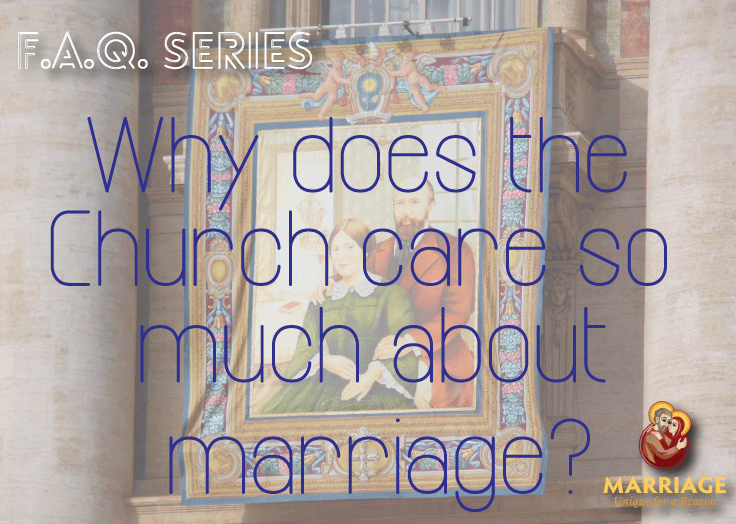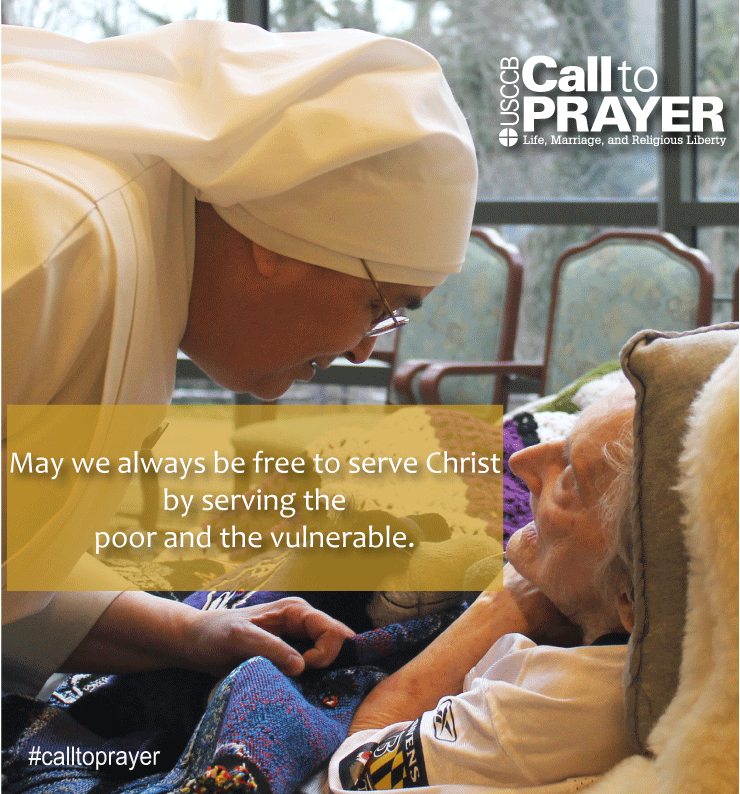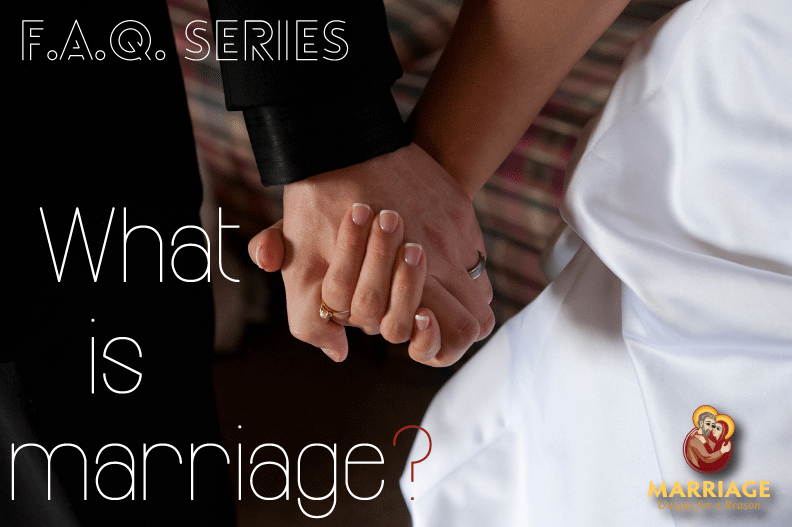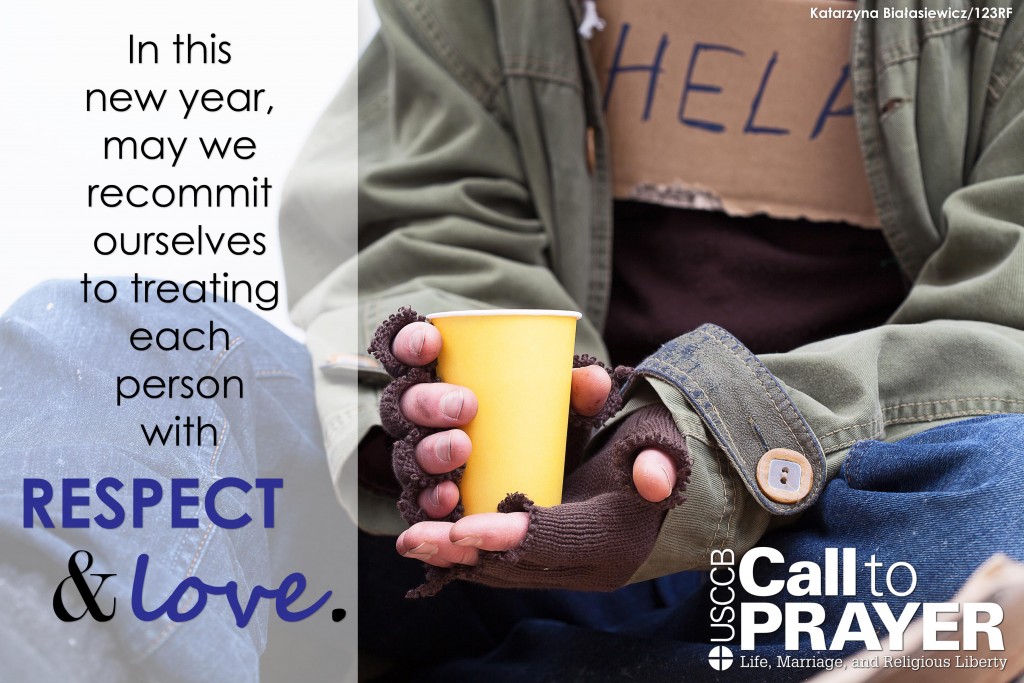FAQ Series: Why does the Church care so much about Marriage?
In this 5-week series, MUR is going over a few of the FAQs on our website. This week we look at FAQ #10: Why does the Catholic Church care so much about marriage?
Short answer: Because it’s such a good thing for people and for society. In fact, nothing really compares to marriage when it comes to creating a stable environment for children, and a strong foundation for communities.[1]
The Church’s ultimate goal is to help people to get to heaven. This is the gift that Jesus made possible by his passion and death, but it’s not automatic. We “work out [our] salvation with fear and trembling.” (Phil 2:12) This means that participating in our redemption is a daily work, a lifelong journey. The Church’s deep desire is for all people to join in this work, to receive the abundant mercy that God is always offering. “For as long as we are alive it is always possible to start over, all we have to do is let Jesus embrace us and forgive us.”
So the Church cares about marriage because she cares about the salvation of married people. All married people. She knows that marriage is the context in which God, in most cases, wants to save people and show them His mercy. In experiencing the total love and acceptance of another human person, who is different but the same, a human being can come to understand God’s love and forgiveness. In having children with that person, giving life out of the union of sexual difference, spouses can come to understand God’s love in an ever deeper way through the overwhelming love they experience toward their children. These are great gifts of love in themselves, and at the same time, they point toward a higher love, a love which also expresses both difference (3 persons) and sameness (one God). This is a way to help them understand what it means to be a man or a woman. Pope Francis talked about this with engaged couples.
In addition to willing the salvation of all married persons, the Church wills the salvation of every one of their children, and as expressed above, there is no healthier context for children than in a home with a married mother and father. It is the best place in which a child can learn what love truly is, and how it includes sacrifice and hard work. In a home where at least one parent is voluntarily missing, children may question whether God’s love, too, is changeable or temporary. It will then be more of a challenge for them to internalize the concept of unconditional love and acceptance.
Much of this is evident through personal experience. Reflect on the people in your own life who either grew up in a home without one or the other parent, or experienced a parental divorce later in life. The Huffington Post is actually running a series right now on the children of divorce, including adults. (For Your Marriage has a round-up about this, if you’re interested.) There are also children who were raised with two parents of the same sex who have spoken about their wound of the missing parent.
In conclusion, marriage has significance not only to the persons contracting it, but to their families, their communities, and – really– the world.
[1] See the numerous research findings by W. Bradford Wilcox at the National Marriage Project, for example.
Archive
FAQ Series: What is Sexual Difference?
For the next 5 weeks, MUR will be going over a few of the FAQs on our website. This week we cover #5: What is sexual difference?
This is one of those funny topics: it seems that you have to be educated to overthink this one. Children basically understand it without too much explanation.
Simply speaking, sexual difference is the difference between men and women, boys and girls. On one hand, it is the most obvious fact of human existence that we all are either one or the other*. The announcement of a doctor, nurse or midwife attending a birth is, “It’s a boy!” or “It’s a girl!”
Every cell in the human body has chromosomes that are either XX or XY, and that seemingly small fact determines many things.* It determines how the baby develops in utero, and affects what hormones are prevalent in their bodies throughout their lives. Sexual difference affects a person at every level: genetically, biologically, emotionally, psychologically, and socially.
Sexual difference can accurately be called an “irreducible” difference; this means that there is a fundamental difference between man and woman that cannot be overcome, ignored, or glossed over except to the detriment of the person. We cannot pretend that the difference does not exist, or that it does not matter. Sad things happen when this is attempted. Instead, we can celebrate our differences and be curious about the gifts that the other half of humanity offers us.
It is a good thing that we are not all the same. Today it may sometimes be hard to acknowledge sexual difference because we fear falling into the abuses or traps of the past, where women were not valued or treated as equal in dignity or responsibility to men. Sexual difference does not and should not mean “opposition or subordination.” As Pope Francis said, “For example, I ask myself, if the so-called gender theory is not, at the same time, an expression of frustration and resignation, which seeks to cancel out sexual difference because it no longer knows how to confront it. Yes, we risk taking a step backwards. The removal of difference in fact creates a problem, not a solution.”
It is only because of sexual difference that two human persons can unite in a total and complete way in marriage. In the words of Carson from Downton Abbey, marriage is when “two persons become as close as two persons can possibly be.” This is what the difference is for: not to divide, but to make spousal union possible. Puzzle pieces cannot be joined together if they are the same! And while human beings can do lots of things on their own, procreation can only be accomplished by the two sexes together.
The video “Made for Each Other” is all about sexual difference. “Made for Life” also addresses it, particularly from 7:20 – 8:50.
*The phenomenon of hermaphroditism or an “intersex” condition will not be discussed in this blogpost. Today we are focusing on the normative development of the human person. “Intersex” diagnoses are estimated to be 0.018% of the population. (Leonard Sax, “How common is intersex? a response to Anne Fausto-Sterling.” Journal of Sex Research, 2002 Aug; 39(3):174-8.) The rest of the blog post is assuming the norm.
Archive
Call to Prayer: January 15, 2016
Archive
FAQ Series: What is Marriage?
For the next 5 weeks, MUR will be going over a few of the FAQs on our website. We are starting with #3: What is marriage?
Here is the Catechism definition: Marriage is the lifelong partnership of mutual and exclusive fidelity between a man and a woman, ordered to the good of the spouses and the procreation and education of children (see CCC, no. 1601; CIC, can. 1055.1; GS, no. 48).
Let’s see how much is covered by that one sentence:
- Lifelong = no divorce, ends at the death of one of the spouses
- Partnership = each spouse gives the proverbial 100% and the two persons are equal
- Mutual = shared in common
- Exclusive = excluding all others
- Fidelity = faithfulness, sexual and emotional
- Ordered to = made, designed, or constructed in such a way as to do X
- Good of the spouses = what is good for both the man and the woman– heaven
- Procreation = helping God to bring new life into the world
- Education = parents are the first educators of their children
At the heart of married love, the Church says, is the total gift of self that husband and wife freely offer to each other, becoming “one flesh” and being open through one another to children, “who are a living reflection of their love” (FC, no. 14).
In other words, when a husband and wife unite in the sexual act, it is not just some form of pleasant recreation, but rather an expression of the unity they seek to live out on an everyday basis through sharing themselves with each other.
Marriage in the Catholic Church between a baptized man and a baptized woman has also been raised to be a Sacrament by Christ.
A sacrament (lowercase s) is a sign of something greater; it points beyond itself to some other reality, and is somehow tied to that reality. For example, the body is the sacrament of the soul. You know that I exist, and that I have a soul, because you see my body and it is a human body.
A Sacrament (with a capital S), on the other hand, is one of the seven formal Sacraments of the Catholic Church which come from Christ Himself to give his people the grace they need for the journey. Each one of the Sacraments has its roots in Scripture and Tradition. Marriage is a unique Sacrament, because it was always a (lowercase “s”) sacrament from the beginning of time. The union of man and woman always pointed beyond itself to something greater: the mystery of a God who is Love. But Jesus raised this natural sacrament to a formal Sacrament at the Wedding of Cana, revealing that it is a concrete sign of his union with the Church. He showed that the relationship of man and woman to one another was also meant to be open to God and his grace.
This also partly explains why the Catholic Church is interested in the civil definition of marriage, not just Sacramental marriage. The union of a man and a woman points to God, even when it is not a Sacramental bond.
Archive
Call to Prayer: January 8, 2016
Archive
Nebraska Bishops Statement on “Transgender” Student Participation in Sports
 On January 4, 2016, the Catholic bishops of Nebraska issued a statement regarding the immanent vote of the Nebraska School Activities Association (NSAA) regarding whether high school students who experience gender dysphoria may participate in sports according to their chosen “gender identity”. They said that allowing biological male students to play women’s sports, or vice versa, would “allow a harmful and deceptive gender ideology” to determine a schools’ activities. “This would certainly have a negative impact on students’ and society’s attitudes towards the fundamental nature of the human person and the family,” they wrote.
On January 4, 2016, the Catholic bishops of Nebraska issued a statement regarding the immanent vote of the Nebraska School Activities Association (NSAA) regarding whether high school students who experience gender dysphoria may participate in sports according to their chosen “gender identity”. They said that allowing biological male students to play women’s sports, or vice versa, would “allow a harmful and deceptive gender ideology” to determine a schools’ activities. “This would certainly have a negative impact on students’ and society’s attitudes towards the fundamental nature of the human person and the family,” they wrote.
The bishops note that every person who experiences gender dysphoria is entitled to respect, dignity, support and concern, but that this support must not compromise the safety, privacy, or rights of all the other students. Read the whole statement here.




